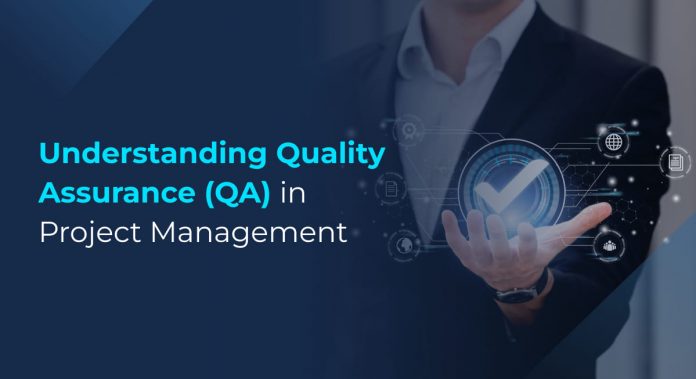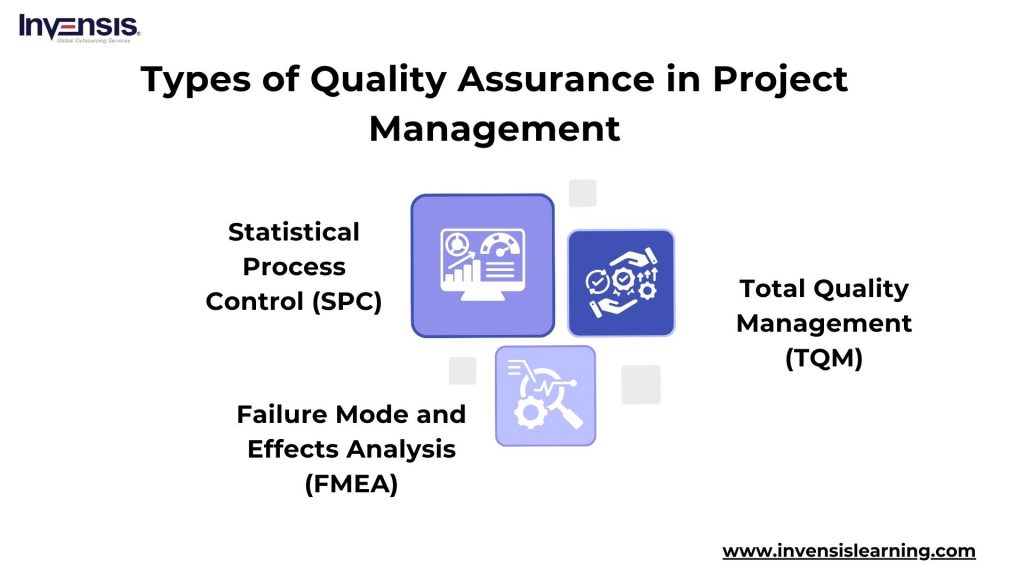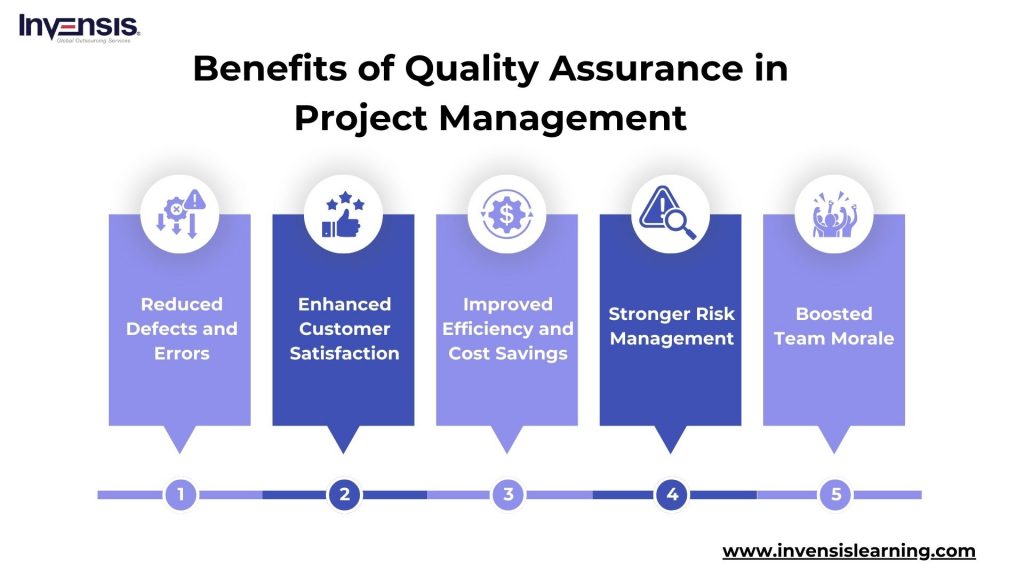
Introduction
In project management, Quality Assurance (QA) is crucial, ensuring that the end product meets the expected standards and satisfies customer requirements. At its core, Quality Assurance encompasses systematic activities and processes designed to prevent defects, errors, and deviations from project specifications.
From software development to construction projects, the principles of QA serve as a guiding force, emphasizing consistency, reliability, and excellence throughout the project lifecycle.
In this blog, we’ll explore the complexities of Quality Assurance in project management, its significance, methodologies, best practices, and its pivotal role in delivering successful outcomes.
Table of Contents
- What is Quality Assurance in Project Management?
- Types of Quality Assurance in Project Management
- Benefits of Quality Assurance in Project Management
- Quality Assurance Vs. Quality Control
- Conclusion
What is Quality Assurance in Project Management?
Quality Assurance in project management refers to the systematic processes and activities implemented to ensure that a project’s deliverables meet specified quality standards and fulfill customer requirements. It encompasses a proactive approach to prevent defects, errors, and deviations from project objectives rather than simply detecting and fixing them after they occur.
QA involves setting quality criteria, establishing processes to meet those criteria, and continuously monitoring and evaluating project activities to ensure compliance. This holistic approach to quality management enhances the final product or service, fosters stakeholder satisfaction, reduces rework, and minimizes risks throughout the project lifecycle.
Types of Quality Assurance Methods in Project Management
In project management, there are different types of Quality Assurance methods to ensure that the project meets its quality standards. These types can vary depending on the nature of the project and its specific requirements.
The three types of quality assurance in project management include:
-
Statistical Process Control (SPC)
This method uses data and ongoing monitoring to improve quality continuously. Imagine tracking project progress through charts to identify trends or potential problems. By analyzing data, teams can proactively address issues and ensure the project stays on track for success.
For Example: A software development project team implements SPC to monitor the number of defects reported in each software build. By analyzing this data over time, they can identify trends and patterns, such as an increase in defects after certain code changes.
This allows them to proactively address coding issues, ensuring that subsequent builds maintain high quality and meet customer expectations.
-
Failure Mode and Effects Analysis (FMEA)
FMEA is a proactive approach which involves brainstorming potential ways a project could fail. Teams then analyze the severity and likelihood of each failure mode, allowing them to prioritize preventive measures. By anticipating potential problems beforehand, FMEA helps mitigate risks and ensure the project avoids critical errors.
For Example: A manufacturing company is launching a new product line and conducts an FMEA session to identify potential failure modes in the production process. During the brainstorming session, the team identifies various failure modes, such as equipment breakdowns, material defects, and human errors.
By assessing the severity and likelihood of each failure mode, the team prioritizes preventive measures, such as implementing equipment maintenance schedules, conducting thorough quality checks, and training employees to minimize the risk of production delays or defects.
-
Total Quality Management (TQM)
This philosophy emphasizes a culture of quality throughout the entire organization. It focuses on continuous improvement and involves everyone on the project team, not just a dedicated Quality Assurance department. TQM promotes ongoing communication, collaboration, and a commitment to delivering high-quality results.
For Example: An engineering consulting firm adopts TQM principles to improve the quality of its project deliverables and client satisfaction. The firm establishes a quality culture by involving all employees in continuous improvement initiatives, such as regular feedback sessions, cross-functional collaboration on projects, and ongoing training programs.
By emphasizing a commitment to delivering high-quality results and fostering open communication and teamwork, the firm enhances its reputation for excellence and attracts new clients.
Benefits of Quality Assurance in Project Management
In project management, implementing Quality Assurance (QA) brings various benefits that contribute to a project’s overall success.
Here are some key advantages:
- Reduced Defects and Errors: Quality Assurance proactively identifies and addresses issues throughout the project lifecycle. This minimizes the chance of errors slipping through to the final product, saving time and resources that would otherwise be spent on rework
- Enhanced Customer Satisfaction: By ensuring the project meets agreed-upon standards and fulfills customer requirements, QA leads to a higher quality final product. This translates to happier customers who are more likely to be satisfied with the project’s outcome
- Improved Efficiency and Cost Savings: Early detection and rectification of issues through QA avoid costly rework later in the project. Additionally, focusing on quality reduces the need for extensive post-release maintenance, leading to further cost savings
- Stronger Risk Management: Proactive QA processes like FMEA help identify potential risks before they derail the project. By anticipating risks and taking preventive measures, QA strengthens risk management and safeguards the project’s success
- Boosted Team Morale: A focus on quality fosters a sense of pride and ownership within the project team. When everyone is involved in ensuring quality, it can lead to a more motivated and engaged team environment
Quality Assurance Vs. Quality Control
Quality Assurance (QA) and Quality Control (QC) are vital components of effective quality management in project execution. While QA focuses on proactively preventing defects and improving processes, QC is concerned with detecting and correcting defects through inspection and testing. Understanding the distinction between QA and QC is crucial for consistently delivering high-quality project outcomes.
| Aspect | Quality Assurance (QA) | Quality Control (QC) |
| Definition | Systematic processes to ensure quality standards are met | Inspection and testing processes to identify defects |
| Objective | Prevention of defects and errors | Detection and correction of defects and errors |
| Focus | Proactive approach to quality management | Reactive approach to quality management |
| Timing | Implemented throughout the project lifecycle | Implemented during specific stages or after completion |
| Responsibility | Shared responsibility among all project team members | Typically carried out by a dedicated quality control team |
| Activities | Establishing standards, processes, and guidelines | Inspections, testing, and verification of project outputs |
| Outcome | Minimized risks, improved processes, and consistent quality | Identifying and addressing defects to meet quality standards |
| Examples | Process audits, training programs, quality planning | Inspections, testing, peer reviews, validation activities |
Conclusion
Quality Assurance (QA) is the foundation of successful project management. It ensures that deliverables consistently meet or exceed predefined quality standards and customer expectations.
By implementing systematic processes, establishing standards, and fostering a culture of continuous improvement, QA plays a pivotal role in preventing defects, minimizing risks, and enhancing overall project outcomes. Utilizing QA principles instills stakeholder confidence and fosters efficiency, reliability, and long-term success in project execution.
Sharpen your QA skills and become a project management powerhouse! Invensis Learning offers in-depth Project Management Certification Courses designed to make you a QA expert. Gain the knowledge and tools to guarantee project success. Enroll today!
















